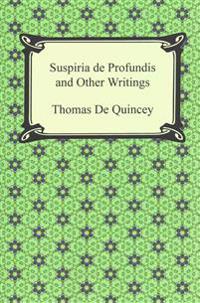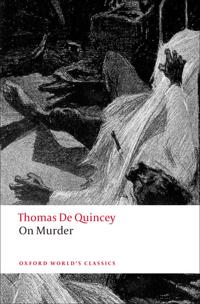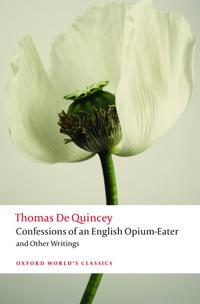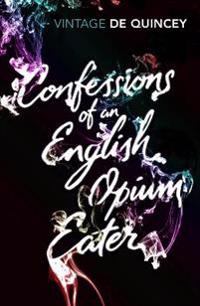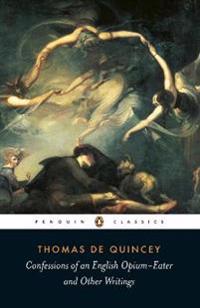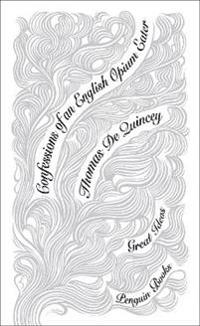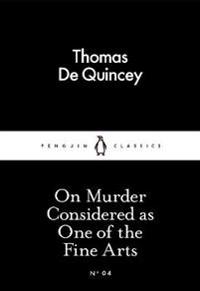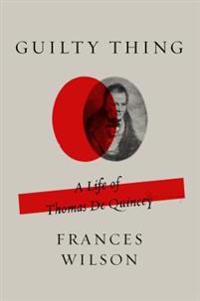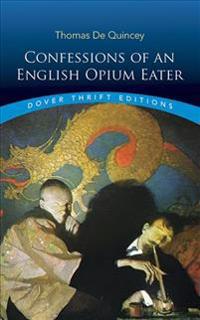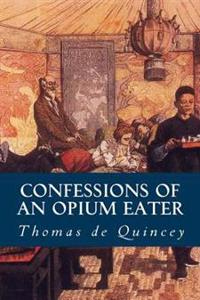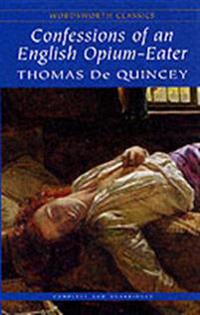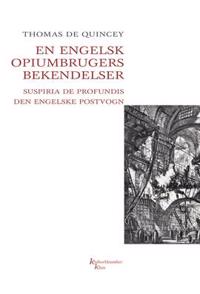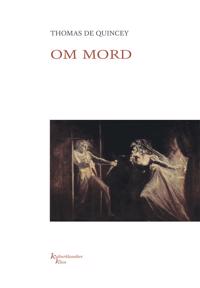Suspiria de Profundis and Other Writings (Häftad)
avThomas de Quincey
ISBN: 9781420940558 - UTGIVEN: 2011-01On Murder (Pocket)
avThomas De Quincey, Robert Morrison, Thomas De Quincey
ISBN: 9780199539048 - UTGIVEN: 200908'For if once a man indulges himself in murder, very soon he comes to think little of robbing; and from robbing he comes next to drinking and Sabbath-breaking, and from that to incivility and procrastination' Thomas De Quincey's three essays 'On Murder Considered as One of the Fine Arts' centre on th[...]
Confessions of an English Opium-Eater and Other Writings (Pocket)
avThomas De Quincey, Robert Morrison, Thomas De Quincey
ISBN: 9780199600618 - UTGIVEN: 201303'I took it: - and in an hour, oh! Heavens! what a revulsion! what an upheaving, from its lowest depths, of the inner spirit! what an apocalypse of the world within me!' Thomas De Quincey's Confessions of an English Opium-Eater (1821) launched a fascination with drug use and abuse that has continued[...]
Confessions Of An English Opium Eater (Pocket)
avThomas De Quincey
ISBN: 9780007920655 - UTGIVEN: 2012-09-13HarperCollins is proud to present its incredible range of best-loved, essential classics.
CONFESSIONS OF AN ENGLISH OPIUM-EATER (Storpocket)
avThomas de Quincey
ISBN: 9780099528593 - UTGIVEN: 2013-01WITH AN INTRODUCTION BY HOWARD MARKS. Once upon a time, opium (the main ingredient of heroin) was easily available over the chemist's counter. The secret of happiness, about which philosophers have disputed for so many ages, could be bought for a penny, and carried in the waistcoat pocket: portable [...]
Confessions of an English Opium Eater (Storpocket)
avThomas De Quincey
ISBN: 9780140439014 - UTGIVEN: 200303A masterpiece of autobiography, and perhaps the first literary memoir of an addict, the "Penguin Classics" edition of Thomas De Quincey's "Confessions of an English Opium-Eater" is edited with an introduction by Barry Milligan. "Confessions" is a remarkable account of the pleasures and pains of wors[...]
Confessions of an English Opium Eater (Häftad)
avThomas De Quincey
ISBN: 9780141043890 - UTGIVEN: 200908Describing the surreal hallucinations, insomnia and nightmarish visions, he experienced while consuming daily large amounts of laudanum, Thomas De Quincey's legendary account of the pleasures and pains of opium forged a link between artistic self-expression and addiction, and paved the way for later[...]
On Murder Considered As One of the Fine Arts (Häftad)
avThomas De Quincey
ISBN: 9780141397887 - UTGIVEN: 2015-02'People begin to see that something more goes to the composition of a fine murder than two blockheads to kill and be killed - a knife - a purse - and a dark lane...' In this provocative and blackly funny essay, Thomas de Quincey considers murder in a purely aesthetic light and explains how practical[...]
Dequincey's Confessions (Pocket)
avThomas De Quincey, Peter Manning
ISBN: 9780321159588 - UTGIVEN: 2013-10-01Guilty Thing: A Life of Thomas de Quincey
ISBN: 9780374167301 - UTGIVEN: 2016-10A dynamic biography of one of the most mysterious members of Wordsworth s circle and the last of the Romantics
Thomas De Quincey was an obsessive. He was obsessed with Wordsworth and Coleridge, whose Lyrical Balladsprovided the script to his life, and by the idea of sudden death. Running away[...]Confessions of an English Opium-Eater (Pocket)
avThomas De Quincey
ISBN: 9780486287423 - UTGIVEN: 199509Thomas De Quincey (1785-1859) is a central figure of English Romanticism. CONFESSIONS OF AN ENGLISH OPIUM EATER, his best-known work, is an account of his early life and opium addiction. De Quincey lived his full three score years and ten. But few would have predicted it, for his father and numerous[...]
Confessions of an English Opium-Eater (Storpocket)
avThomas De Quincey
ISBN: 9781853260964 - UTGIVEN: 199404In the first part of this famous work, published in 1821 but then revised and expanded in 1856, De Quincey vividly describes a number of experiences during his boyhood which he implies laid the foundations for his later life of helpless drug addiction. The second part consists of his remarkable acco[...]
En engelsk opiumbrugers bekendelser (Häftad)
avThomas De Quincey
ISBN: 9788779556843 - UTGIVEN: 2010-01Teksterne i denne bog er skrevet af en narkoman. Thomas De Quincey vandrede hele livet i et opiumfremkaldt tågeland mellem drøm og virkelighed. Hvor tid og sted ikke fandtes, hvor diabolske uhyrer huserede, og groteske ansigter trængte sig ind på ham, hvor krige og storme rasede uophørligt, hvo[...]
Om mord (Häftad)
avThomas De Quincey
ISBN: 9788779558762 - UTGIVEN: 2011En vinternat i 1811 myrdede John Williams en ung familie i London. To uger efter myrdede han en værtshusholder og dennes husholdning. Mordene var blodige og bestialske â men John Williams tog hemmeligheden om, hvorfor alle disse mennesker skulle dø, med sig i graven. MÃ¥ske vidste han d[...]
En engelsk opieätares bekännelser (Inbunden)
avThomas De Quincey
ISBN: 9789176454879 - UTGIVEN: 2016-01-01Soldatnunnan och. Om mordet som skön konst (Inbunden)
avThomas De Quincey
ISBN: 9789189538634 - UTGIVEN: 2003-09-01Suckar ur djupen (Storpocket)
avThomas De Quincey
ISBN: 9789189633018 - UTGIVEN: 200603I syfte att bota enveten migrän och en plågsam magåkomma utvecklade Thomas De Quincey tidigt ett svårt opiumberoende. Paradisets portar slogs omedelbart upp på vid gavel, men han kom senare - under försöken att sluta - att störta ner i sin själs allra djupaste avgrunder.
Under a[...]The Confessions of an English Opium-Eater (Pocket)
avde Quincey, Thomas
ISBN: 9781420927078"I here present you, courteous reader, with the record of a remarkable period in my life: according to my application of it, I trust that it will prove not merely an interesting record, but in a considerable degree useful and instructive." So begins "The Confessions of an English Opium-Eater." Origi[...]

